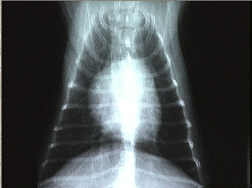
Radiology is routinely used to provide valuable information about a pet’s bones, gastrointestinal tract (liver, pancreas, stomach, intestines, colon), respiratory tract (trachea, bronchi, lungs), heart and vessels, and genitourinary system (kidneys, bladder, uterus, prostate). It can be used alone or in conjunction with other diagnostic tools to identify the cause of a medical problem. The radiographs are also sent to a board certified radiologist.
When a pet is being radiographed, an x-ray beam passes through its body and hits a piece of radiographic film. Images on the film appear as various shades of gray and reflect the anatomy of the animal. Bones, which absorb more x-rays, appear as light gray structures. Soft tissues, such as the lungs, absorb fewer x-rays and appear as dark gray structures.



